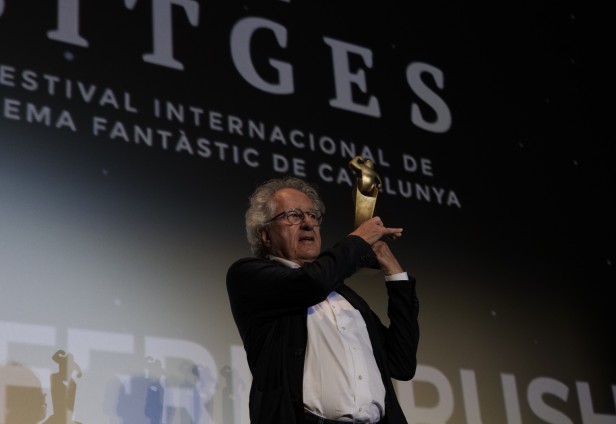
Geoffrey Rush and Christophe Gans Disembark at Sitges2024 on the Biggest Day of national Cinema
10 Oct 2024
Reading 4 min.
The 57th edition of the SITGES - International Fantastic Film Festival of Catalonia welcomes Australian actor Geoffrey Rush, better known as Captain Barbossa, who presents his new film The Rule of Jenny Pen, co-starring John Lithgow. French filmmaker and screenwriter Christophe Gans also took home an award. And today, domestic production offered an exciting double bill with the screenings of Luna and Una ballena (A Whale).
The second Thursday of the Festival kicked off with Call of Water, the second film by Elise Otzenberger that is part of this year's Official Fantàstic In Competition Selection. This dramatic tale about a boy strangely obsessed with water wooed the Auditori with its magical realism. Immediately afterwards, the same venue hosted the screening of Planet B, the return to our screens of Festival regular Adèle Exarchopoulos. French filmmaker Aude Léa Rapin, who debuted with Heroes Never Die, brought us this environmental sci-fi movie which brings together activists, disappearances, and a strange planet and that also features emerging actresses Souheila Yacoub and Eliane Umuhire.
Also in competition are the two domestic feature films that marked the day today, an example of the excellent state of Spanish genre filmmaking right now. For the first time, Luna (Moon in Spanish) lands on Earth -more specifically in Sitges-. The new film by Alfonso Cortés-Cavanillas, the man behind films like Sordo (The Silent War), Ego and Lobo, continues his romance with one-word titles with this sidereal lunar journey with a Gravity vibe. Marian Álvarez, Greta Fernández, Asier Etxeandia and Roberto Álamo star in this involuntary space isolation that was presented today at a press conference. The film's director presents a sci-fi story about the progressive disappearance of contact and affection: “with a space suit on you can't hug or kiss”. About shooting a lunar odyssey within the Spanish film industry, he explained that, for him, the space race “has become a race of egos; there's no humanity in it anymore”. Always hopeful, Cortés-Cavanillas dreams that “this film will open a path to start producing science fiction independently”.
The second canvas in today's domestic diptych is Una ballena (A Whale) by Pablo Hernando, co-director of the low-cost gems Berserker and Esa sensación. On this occasion, the filmmaker from Vitoria sets out to weave a thought-provoking hybrid of rainy film noir and cosmic horror with Ingrid García-Jonsson playing a serial killer connected to a universe of monsters. Before its applauded screening at the Auditori, the team of this example of “Other Spanish Cinema” spoke to the press. The director tells us about how genre moviemaking lands in his story: “I didn't feel like I was consciously mixing genres, I've always had the feeling that the figure of the serial killer and the fantastic coexist by their very nature”. Ramon Barea praised Hernando's work as a director: “he never talked to us about other pre-existing works, he always works from the immediate reality”. Meanwhile, producer Leire Apellaniz assures that “we always try to produce these stories that we haven't heard before, but the system finds that incomprehensible”. Regarding her preparation for the film, Ingrid García-Jonsson explained her atypical methodology: “I watched a lot of videos of whales until I realized that they were too inexpressive, so I switched to videos of octopuses”.
During the course of the Méliès gala at the Auditori, one of the most eagerly awaited moments this Thursday was the presentation of the Career Méliès Award to French filmmaker Christophe Gans, who received the award to a standing ovation from the Festival's audience. This tribute celebrates the career of this director, the man behind such movies that include Brotherhood of the Wolves, the film adaptation of Silent Hill, the remake of Beauty and the Beast starring Léa Seydoux and Vincent Cassel, and his collaboration with Brian Yuzna and Shusuke Kaneko on Necronomicon: Book of Dead.
Awards are what it's all about, because tonight, this year's Grand Honorary Award was also presented to legendary actor Geoffrey Rush. Best known as Captain Barbossa in the Pirates of the Caribbean franchise, winner of an Academy Award for Best Actor for Shine and two BAFTAs for Best Supporting Actor for The King's Speech and Elizabeth: The Golden Age received the award today in honor of his extensive career. Geoffrey Rush made the most of his visit to the Festival to present his latest project, The Rule of Jenny Pen. Directed by James Ashcroft, this geriatric duel, which features John Lithgow, subjected the Auditori to a wave of vintage violence.
At the press conference, the Australian actor commented on his methodology when deciding which projects to choose and which not to choose: “Instinct is what leads me to fall in love with the scripts, I had never played a character like this before”. Director James Ashcroft defends the horror in generational violence: “We wanted to portray an atypical kind of violence, one closer to what we experience during childhood; there may not be a more terrifying violence than that”. On his good off-screen and bad on-screen relationship with his co-star, Rush says, “Lithgow is one of those actors who knows how to enamor the camera, but I warned him that I was going to make sure that wouldn't happen in this film”. Regarding how age has influenced his career and how The Rule of Jenny Pen addresses this conflict, Rush jokes: “I could become a specialist in the wheelchair movie genre”.